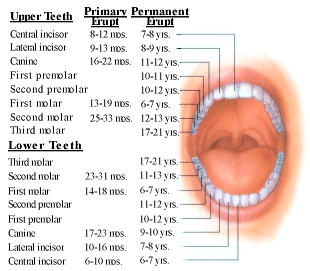

The American Dental Association and American Academy of Pediatrics both recommend that your infant begin visiting the dentist by age 1. Seeing a dentist early is all about prevention. Today’s dental teams can cultivate and protect your child’s smile by identifying risk factors and behaviors that could spell trouble in the future. Most parents are shocked to discover that too much fruit juice and inadequate oral hygiene can result in significant decay by 2 to 3. Start building the best foundation for your child’s oral health and overall health by taking your child to the dentist six months after the first tooth comes in, or by your child’s first birthday. Establishing a ‘Dental Home’ by 1 may eliminate the need for dental fillings by 2.

Before the first birthday
One reason to bring your child in for early dental visits is dental cost savings. If you bring your child in for regular dental appointments, beginning at an early age, studies show you will spend less money on your child’s dental care than parents who don’t. Baby teeth are important. They help your child to eat, speak, and function. The baby teeth also play an important roll in permanent teeth.
What to expect
The first dental appointment is a great time to allow our team to check your child’s teeth, mouth, and airways. We also check for plaque and signs of decay. Our team would ideally like to see your child within six months of them getting his/her first tooth to address any dental needs early. We would rather prevent a problem than fix one. During the appointment, we may put a patient napkin on your child, offer protective eyewear, and even a ride in the dental chair! Our team members will speak with you about homecare, such as brushing and flossing techniques. We also discuss nutrition, your child’s oral health, how a healthy mouth is best for total body health, and ways to prevent decay.
Helpful Tips
-
If your baby is having a difficult time breastfeeding or it is painful for mom, give us a call. Your baby could have a tongue tie or frenum attachment causing your baby to have a difficult time latching on. These ties can easily be released! Mom could start successfully breastfeeding before even leaving the office!
-
Do not let your baby or toddler fall asleep with a bottle with milk or juice.
-
It is best to avoid pacifiers all together. Pacifiers can cause a child's mouth to develop incorrectly creating problems down the road.
-
Do not allow children to frequently sip sugary liquids from bottles or training cups; this can also lead to decay. Even watered-down sugary drinks, like juice, can damage teeth.
Healthy Smile Tips
-
Brush your child’s teeth twice daily with fluoride toothpaste.
-
Clean between the teeth once per day.
-
Eat a healthy diet and limit snacking.
-
Visit your dentist regularly.
-
Use a smear size amount of toothpaste for children 2 and under.
-
Use a pea size amount of toothpaste for children older than 2.
When your baby begins to teeth, he/she may experience gum discomfort. The following may soothe the tenderness:
-
Gentle massage of the gums with a clean finger or wet gauze.
-
Clean teething rings. Avoid local anesthetic containing gels or creams. These products have been linked to serious adverse reactions in some children that have used them.
Please allow our prevention oriented team to take care of your most precious family members. We take pride in our caring and friendly environment that is provided for our patients. From exciting rides in the dental chair to prizes at the end of their appointment, your baby will enjoy their time in our office. New people and equipment can be overwhelming to some little ones, they may cry; this is ok because if they are crying their mouths are open and still allow us to see their developing teeth and mouth. Their crying subsides in a matter of seconds once they see our prize bins! We look forward to helping keep your family healthy.


